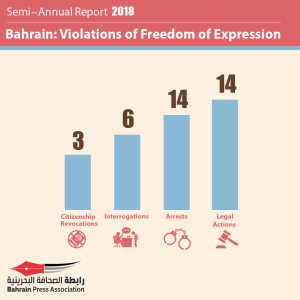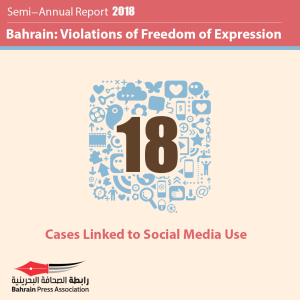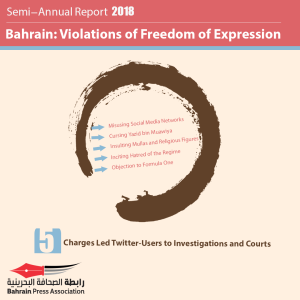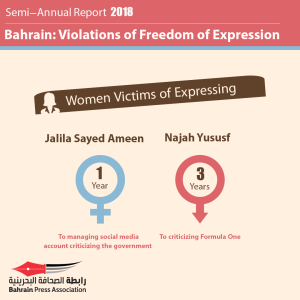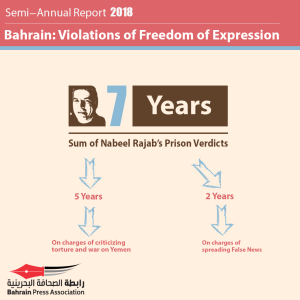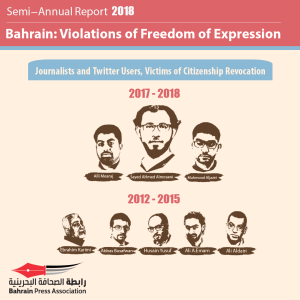The Semi-annual Press Freedom Report 2018
Bahrain is an unsafe place for journalism and critique: 14 judicial decision against journalists and Tweeters, 14 cases of detention and 6 interrogations.
London, United Kingdom – 3 August 2018 – Bahrain Press Association: Bahraini journalists are undergoing hard times as the government continues its war on the remaining available outlets of the freedom of expression. The security authorities have taken full control of media sphere after shutting down “Al-Wasat” newspaper to keep journalism exclusive to the government’s press mouthpiece, as well as completing the blockade of the social media spheres, which have been over the past few years the main debate platforms to exchange opinions and criticize officials regarding matters of public interest. Nowadays, these social media networks have become abandoned, and Tweeters have resorted to hiding behind nicknaming and oblique expressions after encountering high levels of risk except for those accounts supervised by Bahraini activists living abroad.
Bahrain has never witnessed such hard times, even in the toughest periods, such as the National Safety of 2011, when there was, at least, a role for social media to play. Authorities were often forced to comply with the pressure cyber campaigns brought them under. Summoning Tweeters for interrogations and sending them to courts over redundant, baseless charges, such as “the misuse of social media,” has become like the cat-and-mouse game between the security apparatus and Internet activists.
The Bahrain Press Association observed 14 judicial procedures during the first half of 2018 in cases that could be decisively categorized as freedom of opinion and expression. It also observed 14 cases of arrest and 6 cases of interrogation. The lawsuits against social media users have accounted for the bulk of these cases. These charges range from “inciting hatred of the regime” and “misuse of social media,” to “insulting the figures of a particular religious sect.” Journalists and photographers have come in second place after Tweeters on this list of targets during this given time. This is no longer confined to those journalists and photographers who belong to the opposition camp. There were interrogations of those who are typically classified as pro-regime citizens. It seems, however, that when it comes to the freedom of opinion and expression, “all are in the same boat.” Nonetheless, the rigid procedures, especially those associated with the verdicts in force pronounced by Bahraini courts, are almost exclusively against the opposition.
The following are the most prominent cases reported by the Bahrain Press Association that are included its database from January to June 2018.
Courts and Judiciary
The Court of Cassation (15 January 2018) upheld a two-year jail sentence against human rights activist Nabeel Rajab, the head of the Bahrain Center for Human Rights, for “spreading rumors and false news.” A Bahraini court (24 January 2018) sentenced a Shiite cleric to six months in jail for “insulting Yazīd ibn Mu‘āwiya.” The High Criminal Court (21 February 2018) sentenced the prominent human rights activist Nabeel Rajab for the second time to 5 years for condemning torture in a Bahraini prison and the Saudi airstrikes in Yemen. (28 February 2018) A Bahraini court sentenced the former ‘Bahrain TV’ anchor Mohammed Al-Shorouki to 3 months and a bail of 100 dinars to suspend the verdict after he was charged with insulting the former MP Mohammed Khaled. The Court of Appeal (7 March 2018) upheld the sentence against journalist Mahmoud Al-Jaziri of “Al-Wasat” newspaper to 15 years and the Internet activist Ali Ma’raj to 25 years and revoking their citizenships on charges of “joining a terrorist cell.”
The Court of Appeal (21 March 2018) upheld a one-year sentence against the activist Jalila Al-Sayed Amin and a bail of 1000 dinars for “administering a social media account that criticizes the government.” The Bahraini Court of Appeal (27 March 2018) upheld a 10-year jail sentence against the press photographer Sayed Ahmed Al-Moussawi and revoked his citizenship. (18 April 2018) A Bahraini court sentenced the former MP Mohammed Khalid to three months in prison and a bail of 300 dinars to suspend the sentence after he was convicted of “insulting figures of a particular religious sect” on Twitter.
The 5th Minor Criminal Court (9 May 2018) sentenced the Tweeter Sayed Ali Al-Derazi to 2 years in prison for tweets that incite hatred of the regime on social media. The Court of Cassation (4 June 2018) upheld a 1000-dinar fine against the Radio Monte Carlo and France 24 correspondent Naziha Saeed for “working without a license.” (5 June 2018) The Court of Appeal upheld a jail sentence of 5 years against the human rights activist Nabeel Rajab for criticizing torture in a Bahraini prison and the Saudi airstrikes in Yemen. On 20 June 2018, the execution judge refused to substitute the sentence of the anchor Mohammed Al-Shorouki for community service after the court sentenced him to 3 months in prison for insulting the former MP Mohammed Khaled on ‘Twitter.’ A Bahraini court (25 June 2018) sentenced the cyber activist Najah Ahmed Yousef to 3 years in prison for running an online account that posts protests against the “Formula 1” race in her village in Bahrain.
Arrest and Detention Profile
The security authorities (24 February 2018) arrested 6 Tweeters: Mohammed Al-Shorouki, Abdullah Al-Maloud, Khaled Mohammed Mohammed, Rashid Saad Al-Dusari and Fahd Al-Shammri for “creating malicious accounts and disseminating offensive, inflammatory and seditious tweets.” The Public Prosecution (26 March 2018) arrested a cyber activist without disclosing his name for “posting tweets that involve insulting and offending others.” (30 March 2018) The Public Prosecution announced the detention of 3 people for 7 days on charges of “spreading offenses on the social media.” The Bahraini Ministry of Interior (14 April 2018) announced the arrest of Ayman Mohammed Khaled, the son of the former MP Mohammed Khaled, for “leaking information on social media that affects the personal lives of others.” Security authorities (17 April 2018) detained the “National Geographic” cameraman Sayed Baqir Al-Kamil while touring a mall in the capital Manama. He was told that a verdict of a two-month prison sentence was issued against him and that he must appeal against the verdict and pay a fine if he wanted to get released. (12 June 2018) Security authorities arrested the photographer Hassan Qambar who was sentenced to more than 120 years after a police raid in Nuwaidrat.
Investigation and Interrogation
Security authorities (16 January 2018) interrogated the former MP Mohammed Khaled for “insulting a glorified figure of a religious sect” and decided to refer the case to the Public Prosecution on 30 January to consider the case. The Bahraini Public Prosecution (25 January 2018) summoned “Al-Watan” journalist Sawsan Al-Shaer and accused her of “insulting the Bahraini People” in her TV show, “My Responsibility,” broadcast on ‘Bahrain TV.’ The Cyber Crimes Unit in the Administration of Criminal Investigation (21 February 2018) summoned the secretary-general of the ‘Unitary National Democratic Assemblage’ Hassan Al-Marzouq to interrogate him for “tweeting to incite protesters to demonstrate.” (20 March 2018) The Public Prosecution summoned Al-Watan editor-in-chief Youssef Al-Benkhalil following a complaint filed against him by the MP Anas Bouhendi for publishing news about him. The Cyber Crimes Unit (17 April 2018) summoned the Tweeter and the former colonel in the Bahraini Army Mohammed Al-Zayani for interrogation. Security authorities (26 June 2018) summoned journalist Mohammed Al-Ghasra, the director of ‘Delmon post,’ for interrogation concerning news published about the Jaafari Endowment Administration.
The Bahrain Press Association condemns targeting journalists, bloggers, and photographers, which, it believes, has become a systematic and frequent behaviour. It is also one of the main reasons that led to the decline of Bahrain’s reputation at the international level in terms of freedom of the press. The Association calls on the United States, the United Kingdom, the United Nations and all international organizations and bodies concerned with defending freedom of opinion and expression, press and media freedoms to exert urgent pressure on the Bahraini government to:
- immediately and unconditionally release all photographers, media professionals, and activists detained for practicing their work in covering protests or exercising their right to freedom of opinion and expression;
- stop arbitrary prosecutions and arrests and judicial trials on charges of “insulting the king,” “spreading false statements” made against Internet activists and media professionals. Charges such as “protesting” for photographers, “inciting hatred of the regime” for politicians, and all charges pertaining to freedom of expression must be revoked;
- secure the freedom of media and the press and to shut down the Office of Internet Surveillance in the Ministry of Transportation and Telecommunication, and to abolish Law No. (47) that regulates the press, publishing, and printing in the country;
- end the authority’s monopoly of the television, radio and print media and enable the voice of opposition in the media, including reauthorizing the publication of Al-Wasat; and to
- invite the United Nations Special Rapporteur on the Promotion and Protection of the Right to Freedom of Opinion and Expression to schedule an urgent visit to Bahrain.
The Bahrain Press Association would like to express sincere gratitude to all those who contributed to the completion of this report, and to The National Endowment for Democracy (NED) in particular, for funding this report.
